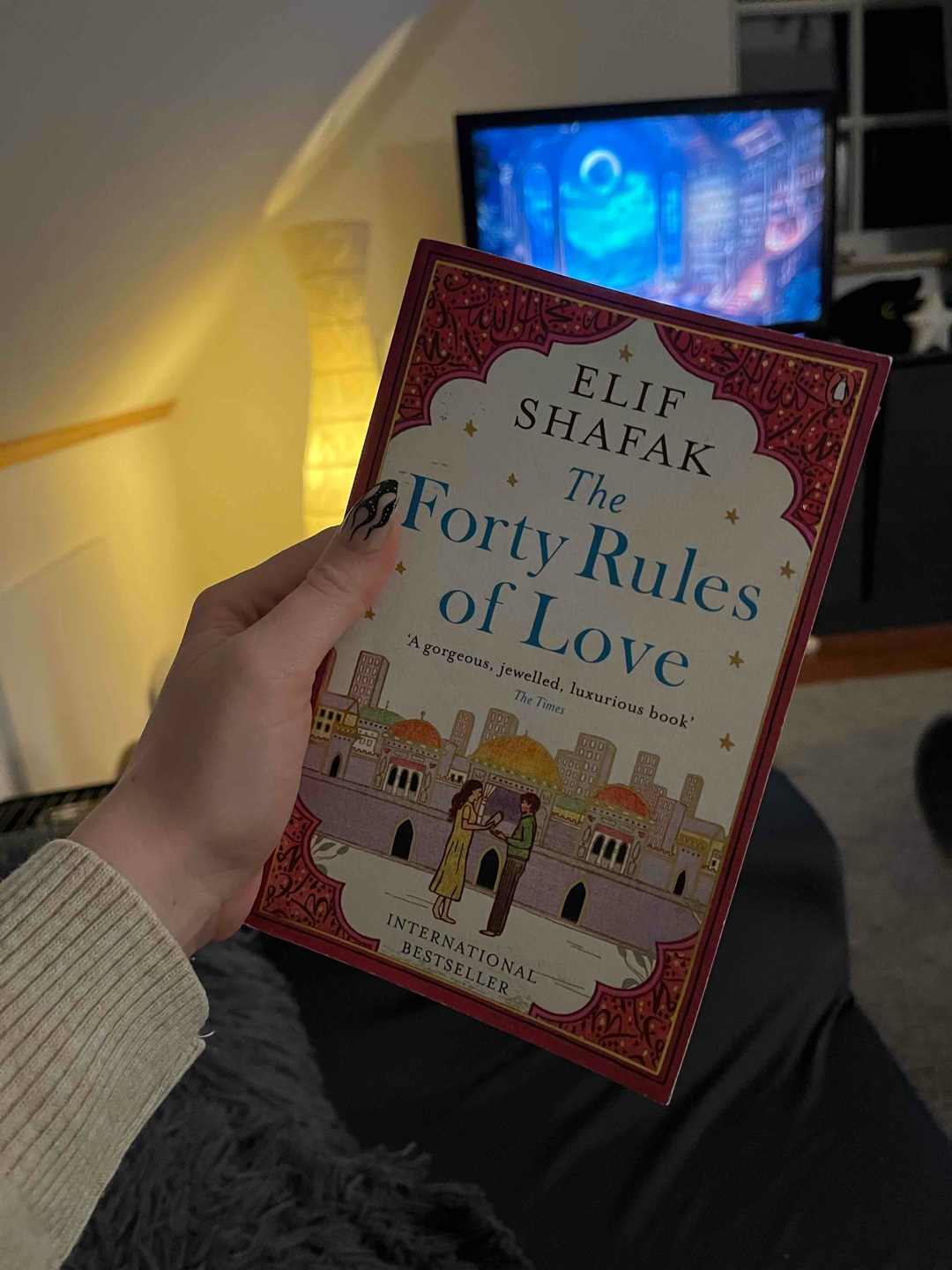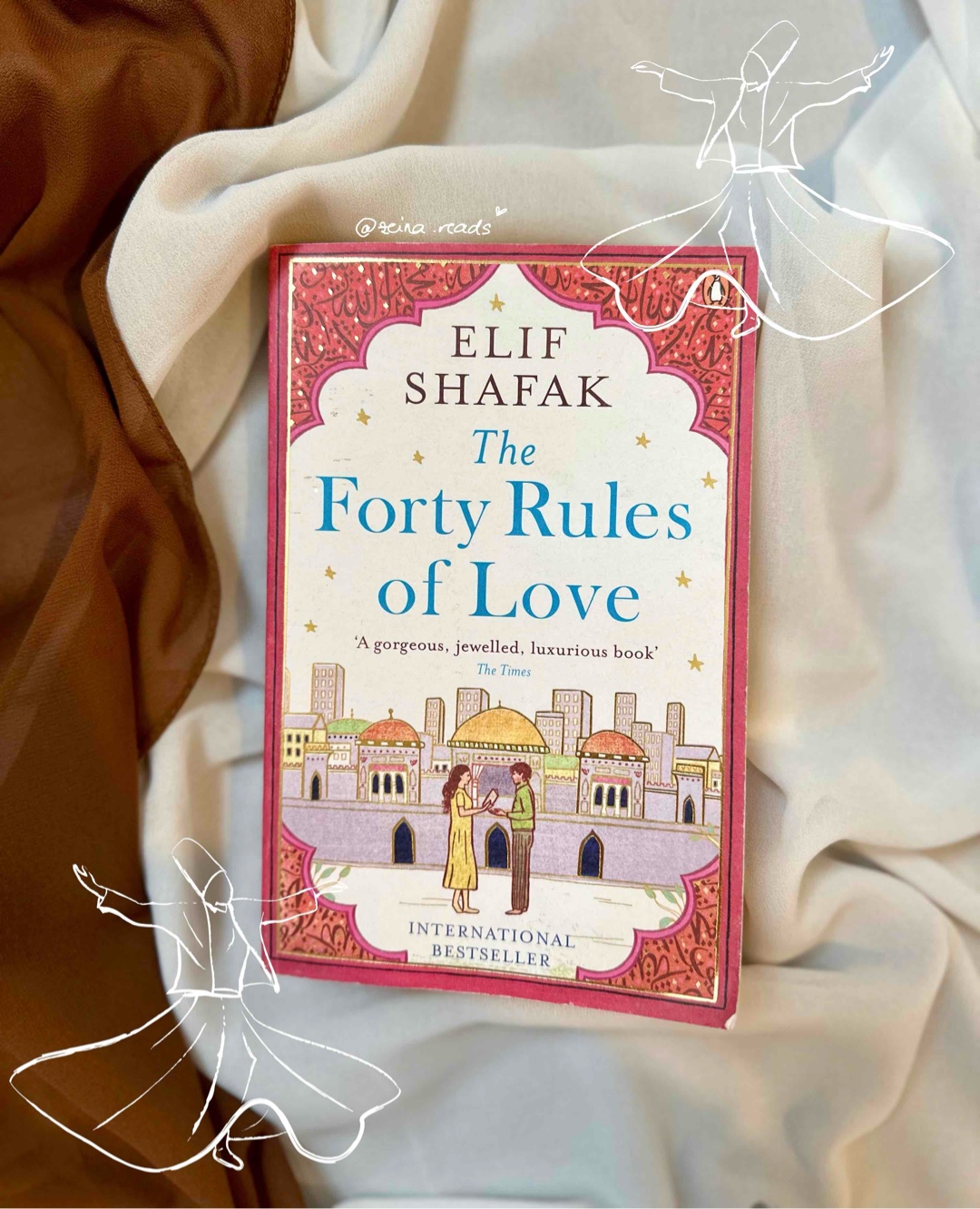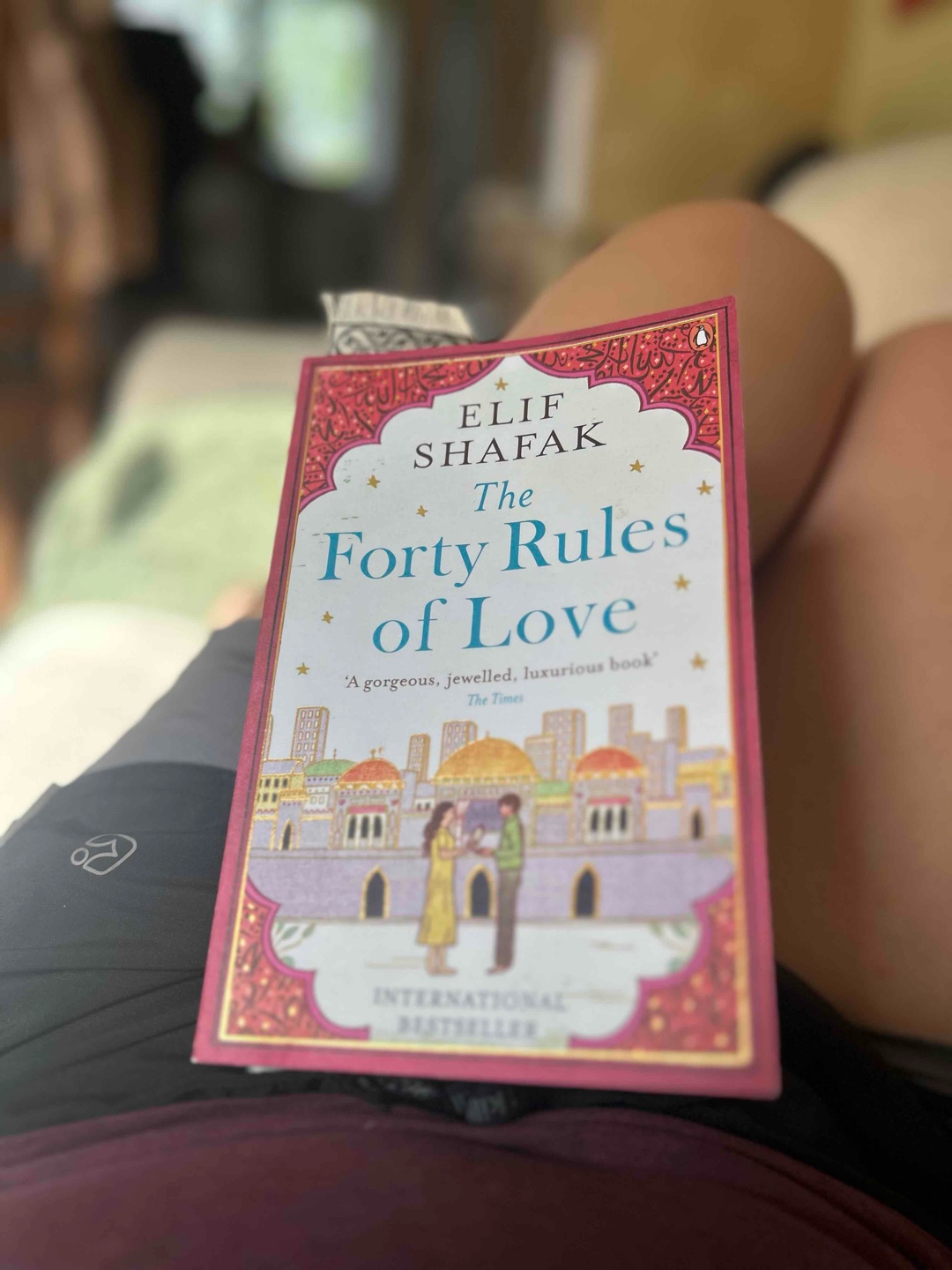The Forty Rules of Love: The magical tale of love and self-discovery from the bestselling author of The Island of Missing Trees
Jetzt kaufen
Durch das Verwenden dieser Links unterstützt du READO. Wir erhalten eine Vermittlungsprovision, ohne dass dir zusätzliche Kosten entstehen.
Beschreibung
Beiträge
I loved it!
I love everything about this book. It is written so beautifully. I was so into it and had all kinds of feelings while reading it. I will definitely read it again.
Liebe, Glaube und Perspektiven
Es hat sehr lange gedauert, dieses Buch zu lesen. Nicht, weil es schlecht ist - sondern weil ich auf jeder Seite zu 100% konzentriert sein wollte. Dieses Buch ist nicht einfach und nichts für die alleinige Unterhaltung. Es hat mich stattdessen viel gelehrt, mich herausgefordert und mich zum Nachdenken gebracht. Wunderschönes Buch!

The Forty Rules of Love is a beautifully written novel that transcends specific religious or spiritual interests. While it delves deeply into Sufi philosophy, it’s not just for those interested in Sufism—it’s a book for anyone seeking deeper meaning in love, life, and self-discovery. Elif Shafak weaves together two parallel narratives: one in 13th-century Konya, focused on the bond between the poet Rumi and the mystic Shams of Tabriz, and the other in present-day Massachusetts, following a woman named Ella as she embarks on her own journey of transformation. The historical storyline, centered on Rumi and Shams, is where the novel truly shines. Shafak’s writing is lyrical, and I often found myself reaching for a highlighter, annotating sentences that felt particularly powerful or insightful. There are so many moments where the themes of love, faith, and human connection are beautifully articulated, inviting reflection and deeper thought. However, as a Shia Muslim, I feel that at times the novel misrepresents or oversimplifies certain religious principles. The romanticized depiction of Sufism, while captivating, sometimes glosses over the complexities of Islamic tradition. Shams of Tabriz is portrayed as a rebellious figure challenging orthodoxy, which can come across as diminishing the role of Islamic jurisprudence and traditional religious practice. For readers like myself who can differentiate between this romanticized story and the teachings of traditional Islam, it remains an enjoyable read, but it’s important to approach it with that awareness. Despite this, the modern-day storyline involving Ella didn’t grip me in the same way. Her journey, while relatable, felt somewhat predictable and lacked the emotional depth of the historical plot. The pacing in this section also slowed the novel down at times, making it harder to stay fully engaged. Overall, The Forty Rules of Love is a captivating and thought-provoking read. It offers universal lessons on love and personal growth that will resonate with a wide range of readers, whether or not they have any prior interest in Sufism. While some aspects of Islamic principles are simplified, for those who can distinguish between the novel’s mysticism and traditional religious teachings, it remains a rich and rewarding experience filled with quotable passages and lasting moments of reflection.

I love how it began... I loved how it ended. In the middle somewhere, I was lost. Maybe older me would appreciate that bit a lot more. However. This book did leave an impression on me and it will stay. If that doesn't tell you how good of a book this one is... I don't know what else will.
The forty rules of love Elif Shafak 🅔🅝🅖🅛🅘🅢🅗🅑🅞🅞🅚🅜🅘🅢🅢🅘🅞🅝 „Love is the water of life. And a lover is a soul of fire! The universe turns differently when fire loves water.“ Kennt ihr diese Zeiten, in denen man Bücher braucht, die warm und streichelnd sind? Dies hier ist eines davon. Und trotz (oder wegen) all der Liebe und Weisheit, die in jedem Wort stecken, fordert es uns auch heraus - alte Denkweisen zu überdenken, uns selbst zu überprüfen und zu überlegen, wer wir sein wollen. ❤️ Elif Shafak schreibt hier in zwei Zeiten - einerseits die Geschichte von Ella und Aziz in der Gegenwart, andererseits die Geschichte von Rumi und Shams im 13. Jahrhundert. Letztere lehrt dem Leser eine Menge über den Islam, respektive Religion und Glauben im Allgemeinen, Liebe und ja, Seelenverwandtschaft und auch Ella’s und Aziz‘ Wege trafen sich genau zum „richtigen“ Zeitpunkt. Man muss auch nicht an all die Dinge „glauben“, die man in diesem Buch liest (ich tu es allerdings) - ich denke, es reicht aus, nichts auszuschließen 😉 Also lasst euch mitnehmen auf eine wundervolle Reise, begegnet interessanten Protagonisten und lest eine Menge Geschichten innerhalb zweier Geschichten (Shams erklärt und belegt seine Regeln der Liebe gern mit Geschichten anderer Personen - manch einer findet das nervig, ich finde es sehr spannend und es hat das Buch für mich sehr abwechslungsreich und easy to read gemacht). Fazit: ⭐️⭐️⭐️⭐️⭐️

My first but definitely not my last book by Shafak. This book made me cry and amaze at the same time. Love it. Adorned with beautiful wisdom and stories, but also many teachings about Rumi and the Mawlana.
Beschreibung
Beiträge
I loved it!
I love everything about this book. It is written so beautifully. I was so into it and had all kinds of feelings while reading it. I will definitely read it again.
Liebe, Glaube und Perspektiven
Es hat sehr lange gedauert, dieses Buch zu lesen. Nicht, weil es schlecht ist - sondern weil ich auf jeder Seite zu 100% konzentriert sein wollte. Dieses Buch ist nicht einfach und nichts für die alleinige Unterhaltung. Es hat mich stattdessen viel gelehrt, mich herausgefordert und mich zum Nachdenken gebracht. Wunderschönes Buch!

The Forty Rules of Love is a beautifully written novel that transcends specific religious or spiritual interests. While it delves deeply into Sufi philosophy, it’s not just for those interested in Sufism—it’s a book for anyone seeking deeper meaning in love, life, and self-discovery. Elif Shafak weaves together two parallel narratives: one in 13th-century Konya, focused on the bond between the poet Rumi and the mystic Shams of Tabriz, and the other in present-day Massachusetts, following a woman named Ella as she embarks on her own journey of transformation. The historical storyline, centered on Rumi and Shams, is where the novel truly shines. Shafak’s writing is lyrical, and I often found myself reaching for a highlighter, annotating sentences that felt particularly powerful or insightful. There are so many moments where the themes of love, faith, and human connection are beautifully articulated, inviting reflection and deeper thought. However, as a Shia Muslim, I feel that at times the novel misrepresents or oversimplifies certain religious principles. The romanticized depiction of Sufism, while captivating, sometimes glosses over the complexities of Islamic tradition. Shams of Tabriz is portrayed as a rebellious figure challenging orthodoxy, which can come across as diminishing the role of Islamic jurisprudence and traditional religious practice. For readers like myself who can differentiate between this romanticized story and the teachings of traditional Islam, it remains an enjoyable read, but it’s important to approach it with that awareness. Despite this, the modern-day storyline involving Ella didn’t grip me in the same way. Her journey, while relatable, felt somewhat predictable and lacked the emotional depth of the historical plot. The pacing in this section also slowed the novel down at times, making it harder to stay fully engaged. Overall, The Forty Rules of Love is a captivating and thought-provoking read. It offers universal lessons on love and personal growth that will resonate with a wide range of readers, whether or not they have any prior interest in Sufism. While some aspects of Islamic principles are simplified, for those who can distinguish between the novel’s mysticism and traditional religious teachings, it remains a rich and rewarding experience filled with quotable passages and lasting moments of reflection.

I love how it began... I loved how it ended. In the middle somewhere, I was lost. Maybe older me would appreciate that bit a lot more. However. This book did leave an impression on me and it will stay. If that doesn't tell you how good of a book this one is... I don't know what else will.
The forty rules of love Elif Shafak 🅔🅝🅖🅛🅘🅢🅗🅑🅞🅞🅚🅜🅘🅢🅢🅘🅞🅝 „Love is the water of life. And a lover is a soul of fire! The universe turns differently when fire loves water.“ Kennt ihr diese Zeiten, in denen man Bücher braucht, die warm und streichelnd sind? Dies hier ist eines davon. Und trotz (oder wegen) all der Liebe und Weisheit, die in jedem Wort stecken, fordert es uns auch heraus - alte Denkweisen zu überdenken, uns selbst zu überprüfen und zu überlegen, wer wir sein wollen. ❤️ Elif Shafak schreibt hier in zwei Zeiten - einerseits die Geschichte von Ella und Aziz in der Gegenwart, andererseits die Geschichte von Rumi und Shams im 13. Jahrhundert. Letztere lehrt dem Leser eine Menge über den Islam, respektive Religion und Glauben im Allgemeinen, Liebe und ja, Seelenverwandtschaft und auch Ella’s und Aziz‘ Wege trafen sich genau zum „richtigen“ Zeitpunkt. Man muss auch nicht an all die Dinge „glauben“, die man in diesem Buch liest (ich tu es allerdings) - ich denke, es reicht aus, nichts auszuschließen 😉 Also lasst euch mitnehmen auf eine wundervolle Reise, begegnet interessanten Protagonisten und lest eine Menge Geschichten innerhalb zweier Geschichten (Shams erklärt und belegt seine Regeln der Liebe gern mit Geschichten anderer Personen - manch einer findet das nervig, ich finde es sehr spannend und es hat das Buch für mich sehr abwechslungsreich und easy to read gemacht). Fazit: ⭐️⭐️⭐️⭐️⭐️

My first but definitely not my last book by Shafak. This book made me cry and amaze at the same time. Love it. Adorned with beautiful wisdom and stories, but also many teachings about Rumi and the Mawlana.



